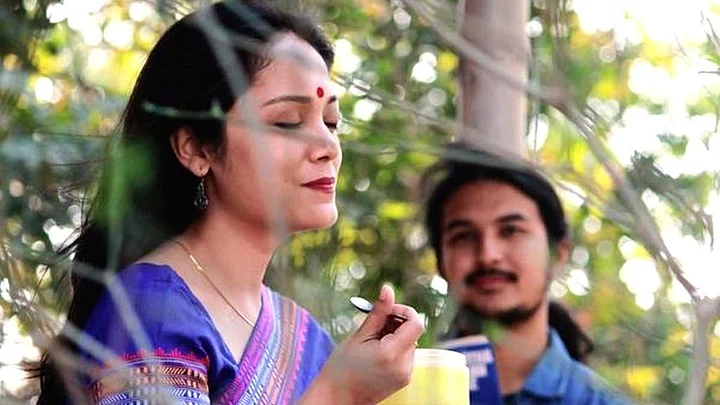ALERT: This review contains spoilers
Two people bonding over a shared love for meat. Sounds “normal”, right? Well, that is clearly not the case in Bhaskar Hazarika’s film Aamis (Ravening), that premiered at the Tribecca Film Festival earlier this year and which is scheduled to release in Assam and selected cities on 22 November.
‘Aamis’ translates to “non-vegetarian”, while the English title ‘Ravening’ refers to devouring or an intense craving. As I flesh out the various themes the film deals with, you will figure out how these two ideas blend to produce a story that is fascinating as well as terrifying.
The quiet town of Guwahati forms the backdrop of a love saga that causes a huge uproar in the country. On a sleepy Sunday morning, a paediatrician Nirmili Saikia (Lima Das) is summoned by a young guy, Sumon (Arghadeep Baruah), to treat his friend writhing in pain. The problem? Indigestion. The friend had tasted meat for the first time and couldn’t stop eating. Meat is not the problem, gluttony is, Nirmili tells Sumon.
With her husband mostly away from home, Nirmili’s stale life revolves around her child and chamber. So when Sumon, a PhD scholar researching on various meat-eating traditions of the North-East, tells her about the meat club that he and some other friends have formed wherein every dish is cooked with utmost precision, a newfound excitement comes crawling into her life. She asks the young student to treat her to a dish from their club, and the pale yellow tiffin box fills their lives with the colour of friendship.
Soon, Sumon introduces Nirmili to different types of meat – catfish with colocasia, bat meat, wild rabbits – and the latter discovers a strange love for the flesh. Sumon, on the other hand, starts developing feelings for the lady.
Aamis abounds in pregnant silence and long conversations. The latter mostly revolves around food.
There’s a mention of a particular type of insect that emits a foul smell but is savoured in some parts of the country. “You have to squeeze the poison out from the insect before it is fit to be placed on our dining tables,” the researcher tells the doctor. Poison becomes symbolic of the gaze of our society to their relationship.
In another sequence, Sumon narrates an incident from his childhood. “My father gave me a rooster to take care of. It was beautiful. I kept tending to it till one day he asked me to slaughter the creature so that we can eat it.” “You didn’t feel bad?,” asked Nirmili, to which Sumon replied. “I did, but succumbed to the hunger.” The same hunger that consumes Nirmili and her “lover.”
So much is her ravening that the dainty lady who refuses to touch meat with her hands and even requests for a fork and spoon at a dhaba devours cold pieces of chicken from the refrigerator as her bewildered husband looks on.
Sumon’s obsession with Nirmili too grows by the day. Hazarika shows his desire to get physical with her in arresting dream sequences. The background score, coupled with an urge to discover the female body, carries with it a sense of uneasiness that runs through the film. When passion crosses boundaries, the researcher devises a horrifying way to satisfy his lust. Nirmili on the other hand, reaches a point where she has to confess a secret that will unnerve you.
While the very idea of Sumon’s decision might gross you out, but the director takes utmost caution to ensure that visceral images are only conjured by the imagination.
He plates every dish aesthetically, making us feel uncomfortable with every scene till the climax hits us hard. In an interview, Hazarika has said that he drew references from In the Realm of the Senses. While the imagery is more graphic in that film, Aamis takes the opposite route.
Meat in Aamis stands for desire, taboo, love and it is also a commentary on the food politics in our country. The different dishes bring to mind Lijo Jose Pelissery’s movies like ‘Angamaly Diaries’ and ‘Jallikattu’. While Lijo revels in chaos, Hazarika chooses the calm to raise a storm within us.
Aamis also makes us question the normal or in Sumon’s words “the definition of normal isn’t universal.”
Added to that is the brilliant camerawork of Riju Das. Every mood speaks volumes about the tension in the air. The scenes where Sumon watches Nirmili close her eyes and relish every morsel stirs up quite a few emotions.
Excellent performances by both the debutantes lift the story. Lima Das aka Nirmili is reserved yet brimming with youthful energy. She judges her friend for getting into an extramarital relationship yet succumbs to a secret so dreary. Sumon or Arghadeep Baruah carries the relationship on his shoulders with brave confidence. Sumon’s shy and innocent smile makes us forgive some of his “crazy” decisions and Arghadeep makes sure we rationalise everything he says. The energy of both Arghadeep and Lima is infectious.
In a film where every frame is so thoughtfully done, the climax was a dampener. But there’s redemption in the final shot where both Sumon and Nirmili touch each other for the first time. The camera pans in on their hands, blurring out the noise of judgement. After all, some relationships are inexplicable and some films genre-bending.
(At The Quint, we question everything. Play an active role in shaping our journalism by becoming a member today.)
